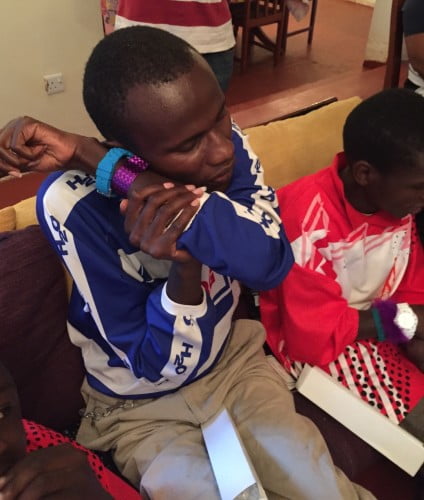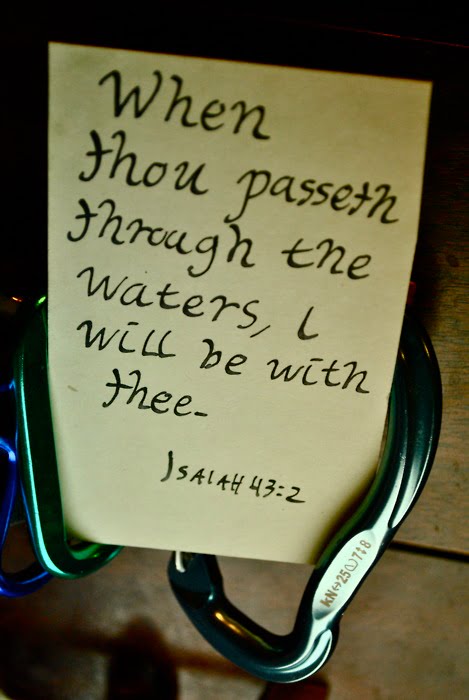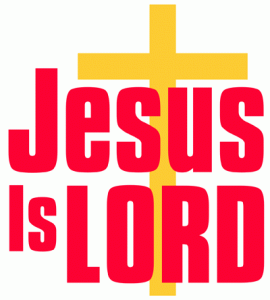A sermon preached at Springfield Christian Church on Jeremiah 33:14-16

How many times in life has someone made a promise to you?
It happens every week, if not every day, doesn’t it?
We’re at the dry cleaners and the woman behind the counter promises our clothes will be ready on Thursday.
We’re at work, and a co-worker promises us an expense report document by Friday.
We’re at home and our spouse promises to take the garbage out during a tv commercial break.
AND how many times in all of this promise making do we find ourselves disappointed?
Our son promises to meet us for dinner at 7 but calls at 6:30 to cancel.
Our best friend promises to come visit us for Thanksgiving but emails us a week before to say she has made other plans.
Our mother promises to stop nagging us about the way we clean our house and then gives us scrubbing brushes for Christmas.
Promises broken.
And in many relationships the cycle continues and continues and continues.
I have a friend who always makes big promises to show up to help me with projects only to be at least an hour late. Sometimes she’s two hours late and even more often a couple days late.
It’s gotten so bad that now we refer to her as the girl who “will be late to her own funeral.”
And with this true, it can be difficult to internalize scripture passages like the one before this morning as it begins by saying “The days are surely coming, says the Lord, when I will fulfill the promise I made.”
Yet, we aren’t so sure about this type of bold faith.
We aren’t so sure about a message of restoration on earth.
It’s just too scary when civilian planes get shot down in Egypt just because.
It’s just too full of broken dreams when national and state borders remain closed to refugees out of fear.
Our world, as we are experiencing it right now is not a place that naturally breads a lot of hope in promises when politicians and world leaders make them every day and break them the next.
To this sentiment, the original hearers of this text would be right there with us. They’d been beaten down in hopelessness too. For these hearers were a ragged, scattered group of Jews living during the Babylonian exile. And it was a time in Israel’s history when a mood of despair was much more the norm. They were refugees.
Their homeland was in ruins.
Their temple rituals no longer drew them together.
Their God, who used to be the ONE consistent thing in their life, felt distant and angry.
And Jeremiah said: “The days are surely coming, says the Lord, when I will fulfill the promise I made to the house of Israel and the house of Judah.”
The specific word of promise came to the house of Judah (known as the good child gone bad) AND to the house of Israel (known as wayward son) saying:
Or as commentator Kate Huey puts it: “Jeremiah doesn't say that things might get better, or could be better, or that [they] should be optimistic about future possibilities. The prophet says that the days are surely coming – and you can count on it because God is the one making this promise.”
I want to pause here and say this, when we read text like this, especially during the Advent the temptation is to immediately skip to talk about the coming birth of Jesus. And it wouldn’t be Advent, of course, if we didn’t read scriptures like this. But how much do you and I miss out on IF we don’t stay with the text as it was created for it’s first audience.
And what a HUGE promise this was for the Israelites! For much like we all have our own version of “the good ole days” and longing for it, Israel’s good ole days was and always would be the reign of David.
So to promise that a righteous branch would come from David’s line was equal to THE best possible future these hearers could have imagined! For throughout the Hebrew scriptures being blessed from David’s line was THE chief sign of God’s favor.
So, wow!
And verse 16 tells us by which what time this branch will be called, “The Lord is our righteousness.”
Or in other words, the way the promise is going to be fulfilled through your merit, Israel. God is going to fulfill this promise through righteousness that could only come from the Lord.
 As I was working on this sermon on the plane on Friday, coming home from Kenya heading back to the US, I was struck by the beauty before me at the moment of take off.
As I was working on this sermon on the plane on Friday, coming home from Kenya heading back to the US, I was struck by the beauty before me at the moment of take off.As our plane was descending into the clouds, a rainbow appeared just off in the horizon. It was a glorious, beautiful, rainbow, one of the most glorious ones I’ve ever seen.
And as I looked at it, with the word of “I will fulfill my promise” from Jeremiah 33 in the back of my mind, I couldn’t help but think about the story that begun in Genesis 6 that is probably very familiar to us. God sends floods to all the earth. God saves one righteous man, Noah and his family through that giant boat. Then after the flood is over says this to Noah, “Let this rainbow be a sign unto you of my promise that I will never send a flood to destroy the earth again.”
And it’s a promised fulfilled until this day, isn’t it?
A flood has never destroyed the earth again.
It is a serious thing. Promises given by God are not like the promises that fellow human being make to us and break so easily to us. Promises given by God are for reliable.
And just like it was a word for the Israelites, I believe there’s a message right here for us. To all of us today struggling with broken dreams, unfavorable lots and fair weather friends, God’s heart says to our hearts:
I will fulfill my promise to never leave nor desert you.
I will fulfill my promise to never tempt you beyond what you can bear.
I will fulfill my promise to never stop loving you.
And the list could go on with all the other promises made throughout scripture.
But here’s the thing about the timing of the fulfillment.
I am about to say something that I don’t like very much and I can imagine that you might not like either . . .
I’ll say it again. God’s promises are often not fulfilled in the timetable that you and I want them to be fulfilled in. But this does not make them any less true.
Again this is where faith comes in.
This, my friends is exactly what the season of Advent is all about, pausing to remember God’s timing—and it’s completely countercultural to what is going on out there on the city streets and in the malls which already pronounced Christmas over and put out Valentines decorations yesterday.
No, in the church during this season, we stay close to every moment, making the most of every single moment of what can be learned while we are:
Waiting.
Hoping.
And believing that God will indeed fulfill ALL of God’s promises to us.
 On Thursday, my husband and I shared a Christmas party (a little bit early) with the 100+ children who are a part of an orphanage in the Dagoretti sums of Nairobi.
On Thursday, my husband and I shared a Christmas party (a little bit early) with the 100+ children who are a part of an orphanage in the Dagoretti sums of Nairobi.
One of the things I like best about the programs run by this children center is they believe that no child, no matter their age or disability is ever to be left behind.
There’s a group of young men, mostly in their 20s and 30s who have aged out of the residential center for younger children but are unable to care for themselves because of their extreme disabilities. So, a new house was created for them called the Hardy home.
Over the past several years that I have gotten to know Martin, he’s always asked for one thing when it comes to Christmas presents with a bright smile on his face. “I want a talking watch,” he says. “I want a watch that tells me the time.”
Of course, my husband and I were listening to Martin’s repeated requests for a talking watch. But come to find out they are hard to find.
No shop in Kenya sold any. And no jewelry store I ever went into in the US ever had one in stock. So years passed. For the past several years, I kept asking Martin, wouldn’t he like something else. Actually trying to prod him toward something easier to find like cologne or a computer game . . .
So we kept looking. And finally, this year, thanks to an extensive online search, we found one. We couldn’t believe it. It was a battery operated, talking watch.
So when the moment came to present the gifts at the Christmas party, you should have seen the joy on Martin’s face and all of his housemates when the watch box was opened and it resounded, “It’s 2:30 pm.”
Martin so proud. We could hardly keep him sitting down. For all Martin wanted to jump up and down and up and down and say, “My talking watch, my talking watch.”
So for many of us participating in this moment of this gift, we also felt hope born in us anew.
If a young man with disabilities in a remote part of Nairobi with no means of income can wait and hope and ask for what he wants with such clarity, believing in his heart that ONE DAY it would happen, so could we!
And so can you, my friends!
We serve a God who never lets even death be the last word.
We serve a God who brings light to even the darkest of nights.
We serve a God who gives our terror filled world hope.
The days are surely coming says the Lord, when I will fulfill my promise.
For as Edward Hayes wrote in A Pilgrim’s Almanac, "Advent is a winter training camp for those who desire peace."
Do you desire more peace, more love, more joy for our world?
For the days are surely coming! Let us hope together believing in the One who will and does fulfill promises.
Thanks be to God.
AMEN
On Monday, November 4th, I celebrated the 7th anniversary of my ordination.
Seven years ago this week, I stood at the front of a church-- Calvary Baptist Church in Washington DC and said to the congregation gathered of family, friends and congregation members that I would serve God in my vocational pursuits. I said I would set aside personal interests for the sake of the community of Christ. I said I would seek to embody, teach and share the gospel with my life. I said I would do all of this for as long as I lived.
 After the service, we gathered in the church social hall and ate sausage balls and cheese dip among my other favorite snacks made by my future mother-in-law. There was a cake with a picture of me preaching with a huge, "Congratulations, Pastor Evans!" on it.
After the service, we gathered in the church social hall and ate sausage balls and cheese dip among my other favorite snacks made by my future mother-in-law. There was a cake with a picture of me preaching with a huge, "Congratulations, Pastor Evans!" on it.
A big day all around.
The night before the service, I sat upright the in bed lounging with my closest girlfriends who came into town for the celebration (Baptist ordained pastors as well) trying not to be so anxious.
Over a bag of chips on top of the brand new white comforter I finally had the money to buy in my first post-seminary job, I recounted to them my deepest fear about the hours to come.
It wasn't about the music going awry.
It wasn't about the having to kneel for so long at the front of the church without my legs falling asleep as people prayed prayers of blessing over me.
It wasn't whether or not I'd be able to pray the benediction as I'd planned to say without being too emotional.
No, it was a cry of: "I don't want my life to be over."
I was having pre-ordination jitters; the kind where I really knew that this moment in my life was a really big deal.
And even as my pastoral support girlfriend team sought to calm me down saying that my life wasn't really over. They said things like, "You'll still have fun. . . We'll make sure of that. Being ordained doesn't make you any less human." There was part of me that felt the weight of the shift.
It was like I was getting married to God. I had one last night of freedom.
I ate more chips.
And though I had done everything I could to finally make it to this day-- the improbable feet as a Baptist woman in ministry getting a Reverend in front of her name-- when I stood in front of the altar on November 4, 2006, the relationship of God and I being in an more intense partnership was never exactly what I envisioned it to be.
This would be no easy marriage.
Though I'd grown up with a pastor for a father and knew all the social expectations that came with the title, to be the Rev myself was entirely new. Because all of the sudden the expectations didn't just come with my family name but it was what I'd chosen.
I'd chosen to be the one who would be asked to publicly pray more than the norm.
I'd chosen to be the one who would be asked to stand the gravesides of the grieving, the bedsides of the sick and on the doorsteps of the bewildered seekers.
I'd chosen to be "on call" 24-7 when pastoral emergencies arose in a congregation.
I'd chosen that when the day came that I was legally married to a man that he'd be the kind of man that also supported the marriage I'd been pursuing long before we'd ever met.
But as is with most marriages, as it was with my ordination, it was not a one-sided deal.
God long before had chosen me.
Not that I was more special or "called" than others with different kinds of work, but that this was my path to walk with God.
And in many ways my "fear" was indeed right on-- my life as it was before 11/4/06 was over.
In this new relationship that God and I would share together, greater discipline and sensitivity to the Spirit would be required.
No longer could I ever assume that my faith was for my own edification alone, but was for the blessing of my community.
No longer could I act as though I didn't need community, for as much as they needed me, I needed them.
No long could I live in such a way that forgot the day that God and I got married-- for if their ever came a time when I felt like a new vocational path was given to me-- I'd need to release this marriage in a public way just as it was given to me.
Being married is a long-term commitment.
Seven years ago it all began. Together God and I are still on this journey.
Stay tuned for part 2 of this series coming soon . . . Seven years later.
Promise in the Night Lenten Series: I am the Lord
Isaiah 43:1-7 with Mark 14:43-46, 53-62
 This morning as we begin our conversation together about this week's promise in the night-- Jesus saying to us, "I am Lord." I think it might be good if you are willing to work with me here for us to take a time out and talk to each other before I get into the main ideas of what I would like to share with you. So this is what I need you to do. Make sure you are sitting next to somebody. No one is allowed to sit in a pew by themselves. If you are a guest visiting with us, know that our church is quite informal and friendly (like I hope you've experienced already today), so we welcome you to participate in this discussion with us too.
This morning as we begin our conversation together about this week's promise in the night-- Jesus saying to us, "I am Lord." I think it might be good if you are willing to work with me here for us to take a time out and talk to each other before I get into the main ideas of what I would like to share with you. So this is what I need you to do. Make sure you are sitting next to somebody. No one is allowed to sit in a pew by themselves. If you are a guest visiting with us, know that our church is quite informal and friendly (like I hope you've experienced already today), so we welcome you to participate in this discussion with us too.
And this is what I want you to share as you feel comfortable with one another: "Who is Jesus? And what does Jesus mean to you?" Share your answer to this question in a small group of 2 or 3 sitting close beside you. If there is anything I know about Washington Plaza, it is that you don't have trouble being honest with one another, especially when it comes to matters of faith. So, in this spirit of "there is no wrong answer" I invite you to share with one another right now, "Who is Jesus? And what does Jesus mean to you?" (SHARING)
I hope that as you shared with your neighbors, you learned something about them that maybe you didn't know before. . . The question of "Who is Jesus?" is central to the gospel passage we find ourselves in this morning. For, just as we have been preparing for the past two Sundays as we read of the plot Judas set into motion to turn Jesus over to the chief priests, at this juncture of Mark 14 starting with verse 53, it is all happening.
The elders of the religious councils have come to Jesus with swords and cubs and have taken Jesus into custody. And though there seems to be little credible evidence against him, with everything said against him appearing to be hearsay, Jesus is put on trial. In this trial, he is accused of the most serious of religious crimes at the time. He says he's the Son of God.
Look with me at Jesus' exact response in verse 62 of Mark 14. After Jesus was asked, "Are you the Christ, the Son of the Blessed one?" He responds by saying, "I am . .. And you will see the Son of Man sitting at the right hand of the Mighty One and coming on the clouds of heaven."
If Jesus wanted to beat around the bush and speak in politically correct language of the time, this was not the way to go. In a culture that held so much respect for the name of God--- not even writing out all the letters when putting God's name on paper-- saying that you were "the Christ" was heresy.
Let me be clear here when I say, that it is this very confession: "I am the Christ" that led to his death.
Though centuries of strained Christian/ Jewish relations and a lot of Judas haters out there who want to place the blame on a the Jewish people as a whole or on the one bad apple disciple-- these players in the drama played minor, very minor roles in the larger drama of what God was doing in the life of Jesus.
Because in the end, Jesus came to this dreadful juncture of his life for one simple reason. He said he was Lord. This dark night was ALL about Jesus' Lordship. The chief priests, the whole Sanhedrin council and Judas for that matter were simply players in the story (and the players could have been anybody) who helped to illuminate this truth: Jesus was Lord.
Can you imagine how dark this night of betrayal, arrest, and interrogation must have been for Jesus?
Can you imagine how lonely he must have been?
Can you imagine how abandoned Jesus must have felt by those he trusted the most?
Can you imagine how Jesus' human nature desperately wanted to call upon the bands and bands of angels and archangels and strike down all who sought to speak wrongly of him? But at the same time, his heart burst in compassion for those misguided in truth? What a conflicted, hurt and deserted place Jesus was in!
Where was the hope? Where was the promise for the night? Where was the light?
If we turn over to our Old Testament lection for today, what we find are words of comfort for a group of people, who like Jesus, found themselves in an unfortunate situation. All was not right with their world either.
The children of Israel lived in Babylon in exile, and had lived there for a very long time. The prophet exhorts them: soon they'd be asked to go back to their homeland, even as they'd grown quite comfortable in this foreign country. They'd be asked to deal with the ways in which they'd fallen short of God's best for them. They'd have to face up to their own darkness, the blindness of their own hearts. And, they'd be forced to make changes for the journey that awaited them.
And while the word of the Lord could have been harsh and accusatory, it's not the promise we hear as chapter 43 of Isaiah opens. For the promise begins in the shift of how the Israelites were addressed: "BUT NOW, thus says the Lord, he created you, O Jacob, he who formed you, O Israel: Do not fear, for I have redeemed you; I have called you by name, you are mine."
And what follows are some of the most beautiful words of comfort in scripture-- words that I wrote down and put on the wall of my bedroom as a teenager to get me through some difficult times-- words that I often read now at every funeral I preach in an effort to speak words of comfort to mourners-- words that speak of God's promise to walk with us even in the darkness of dark nights.
Look with me at verse two: the Lord says, "When you pass through the waters I will be with you; and through the rivers, they shall not overwhelm you; when you walk through the fire you shall not be burned, and the flame shall not consume you." WHY? Because we are told, "For I am the Lord your God."
Such is a promise full of dramatic metaphors which illustrate God's promise to walk with us no matter what situations we find ourselves in.
What is most interesting to me about this passage is what it doesn't say about the journey of faith.
It doesn't say that we won't pass through rivers. It doesn't say that we won't walk through fires. It doesn't say that flames won't get anywhere near us. Though most of us would like to assume that if we just try hard and love well and live the best life we can that life's darkness nights won't find us, Isaiah's promise of prophecy does not guarantee us this at all. In fact, if we have found ourselves deep in rivers or in the middle of fires, or feeling as though our lives are going to crumble at any moment, then we are in good company. We are well acquainted with what it means to be a human being-- just as Jesus experienced on his dark night too.
But even though our lives are full of troubles and there will be moments when the nights of winter seem long and unending-- we receive a hopeful promise. Jesus is Lord.
 And not just any Lord-- a word that might be scary to our independent sentiments of a society. But a Lord who loves us unconditionally, a Lord who pledges to be in our lives no matter what, a Lord who holds out joy for us when it seems to be the emotion we fear we'll never experience again.
And not just any Lord-- a word that might be scary to our independent sentiments of a society. But a Lord who loves us unconditionally, a Lord who pledges to be in our lives no matter what, a Lord who holds out joy for us when it seems to be the emotion we fear we'll never experience again.
Look with me at verse four, "Because you are precious in my sight, and honored, and I love you , I give people in return for you, nations in exchange for your life."
It's a love letter for a particular people, a love letter from a God who wants to show forth the light of the good news. I am the Lord.
I don't know where you are in your journey of faith this day-- believer growing, eager to go deeper in your faith, skeptic standing on the sidelines not ready to say you believe in this Jesus story yet, or somewhere in between, but I dare say wherever we find ourselves this morning, we've ALL had experiences where we've experienced God's presence with us, especially in difficult times. (For it seems our awareness of God seems to be softened to receive most memorably when we hit a place of helplessness, lostness, or even feeling as though our lives are so bad "that there's no place to go but up.")
For me, one such time when I felt God's presence with me came when I was on my first trip out of the country to Africa as a freshman in college. Alone, I traveled to spend three weeks with some missionary friends of our family. Eager to experience the culture of some new nations and to be with folks I thought at the time were some of "God's best people on earth" (i.e. the American missionaries) I boarded the plane and set out for what I thought would be a life-changing adventure.
However, the trip turned out completely not as I expected. These missionaries, I admired from afar, turned out not to be the welcoming bunch I hoped they'd be-- to me a young adult hoping to follow in their footsteps one day. None of them really seemed to care to get to know me at all. The missionaries were among some of the most rude, selfish-centered and arrogant people I'd ever met. You could imagine how crushed I was. All my dreams for a career in international service felt ruined. There was no way I'd want to work in a community like this! What in the world, was I then going to do with my life? And did I even want to follow this God?
But, in spite of the unfortunate turn of events, grace found me. This grace came from two women, whom I don't even remember their names anymore who I worked alongside as I taught at Bible camp during one of the weeks I spent with the American missionaries. These two women, from the US like me, but in particular, came with the purpose solely of teaching some of the missionary's kids while their parents sat in meetings. And, I have to say, if I ever met an angel on earth, I know it was these two women, who said they were from Alabama. They nurtured me, welcomed me to teach with them and showed me through their actions that I was not as alone as I felt at the time. God spoke through me and my broken spirit at the time to say, "I am the Lord; and it is going to be ok." I don't know if I would have made it back home in one piece if it weren't for these two women.
In the same way, one of the things I hear most often from you, even those of you who still have great doubts about your faith and wonder if you are a Christian at all, is that you've experienced God's presence in dark times of your life. You've had experiences where you've encountered this promise in the night of "Fear not, for I am with you." You've received comfort from something you can't explain in rational terms. You've experienced what you can only call the divine. And these are moments that we remember.
But the thing is that though many of these experiences are impactful in the moment, our memory as a human race is short. How quick we are to forget! How quick we are to doubt! How quick we are to throw up our hands in disgust, wondering why we find ourselves drowning in rivers again, feeling as though we have no life-preserver to help get ourselves to shore!
Such is why today's promise in the night is so important. Jesus is Lord. For in fact it is the promise, if we remember nothing, I mean absolutely nothing else about the Christian life, it is the promise we need. Because knowing and believing that Jesus is Lord changes EVERYTHING about our personal lives, about our life together as a church and about our outlook for the future.
 And because Jesus is Lord as we walk this journey in community, everything begins to look different. We get out of our pettiness, our focus completely on ourselves, and we look up to the one who is the Lord.
And because Jesus is Lord as we walk this journey in community, everything begins to look different. We get out of our pettiness, our focus completely on ourselves, and we look up to the one who is the Lord.
When we are figuring out who is bringing what for coffee teams on Sunday morning and how to clean the tables, we remember: "Jesus is Lord."
When we are choosing what color to paint our walls in our bedroom with our spouse and really want to strangle him or her for their tacky taste, we remember: "Jesus is Lord."
When we are deciding if we will buy just one more thing at the mall or make our pledge to the church- we remember: “Jesus is Lord."
When we find ourselves bickering and then not speaking to a dear friend for weeks-- we remember: "Jesus is Lord."
When quick fire backs of anger seem more enticing than going the extra mile in life-- we remember: "Jesus is Lord"
When folks slander us, speak ill of us for reasons we know are untrue - we remember: “Jesus is Lord"
And, most of all when we find ourselves in bleak situations when we wonder how in the world we are going to get out of bed and face another day, we remember what? "Jesus is Lord."
For this promise in the night or in the day or in the in between can make all the difference in our lives my friends. For when we get out of the framework of this life is about me, me, and more just me, we realize that though the road of following the Lord may be rocky and though the journey may be long, we have this larger truth in which to cling. And what is it? Jesus is Lord.
AMEN